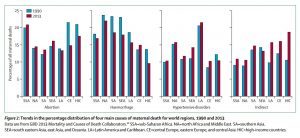The Lancet Maternal Health Series published in September 2016 contains six papers highlighting the importance of improving access to high quality maternal health care for all women across the globe. In paper 1, “Diversity and divergence: The dynamic burden of poor maternal health”, Graham and colleagues examine the changing distribution of causes of maternal death and disability (diversity) and the persistent inequalities between and within populations (divergence). The authors suggest that demographic, epidemiological, socioeconomic and environmental transitions have all played a part in creating these trends in maternal health.
Diversity
While some of the major causes of global maternal mortality and morbidity—complications from unsafe abortion, postpartum hemorrhage, hypertensive disorders including pre-eclampsia/eclampsia and other indirect causes—have remained such over the last two decades, the distribution of these causes has changed substantially. Between 1990 and 2013 in most regions, maternal deaths due to hemorrhage declined, but maternal deaths due to hypertensive disorders and other indirect causes such as severe anemia, infection, chronic hypertension, malaria and other pre-existing conditions increased. During that same period, maternal deaths due to complications from unsafe abortion declined in some regions but increased in others. This shift exemplifies the importance of understanding the dynamic causes of maternal death and disability in relation to place and time so that interventions aiming to reduce preventable maternal mortality and morbidity can be tailored to particular contexts.
Divergence
A primary focus of the Sustainable Development Goals is reducing inequality within and among countries. Progress at the aggregate global level tends to mask regional and national inequalities. Fifty-nine percent of global maternal deaths occur in just 10 countries, and two countries in particular—India and Nigeria—account for 34% of the global maternal mortality burden. Furthermore, regional disparities in maternal mortality have widened in some cases over time: The proportion of maternal deaths occurring in sub-Saharan Africa, for example, increased from 42% in 1990 to 66% in 2015. While rising fertility rates likely contribute to this trend, inequalities in access to and quality of care and social determinants including wealth, education and place of residence are powerful drivers. Additionally, improvement in health outcomes at the country-level can occur even when the health of some populations in that country remains stagnant or declines. Within countries, poorer women, women living in rural areas and women with low education levels are at greater risk of being unable to access health services, receiving poor quality of care and dying from pregnancy or childbirth-related causes.
An incomplete picture
While the use of population-based surveys such as the Demographic and Health Surveys and Multiple Indicator Cluster Surveys has improved access to national data, enormous barriers persist. Particularly in low- and middle-income countries, national health information systems lack the capacity to accurately identify inequalities in health access, quality and outcomes. Because of these data gaps, current estimates of maternal health inequalities are probably low. While collecting data at the health facility level has its benefits, these data are not generalizable to an entire population since the worst off are least likely to access health services. Thus, measuring the true burden of maternal mortality and morbidity and identifying the most vulnerable women is challenging. Given the trends of diversity and divergence in global maternal health, access to accurate, disaggregated data is more important than ever in order to ensure that interventions reach those who may otherwise be left behind.
—
Read this paper and others in The Lancet Maternal Health Series.
Learn about the Maternal Health Task Force’s role in developing indicators to monitor efforts toward ending preventable maternal mortality.
Graph: Graham, W et al. Diversity and divergence: The dynamic burden of poor maternal health. The Lancet Maternal Health Series, 2016.

